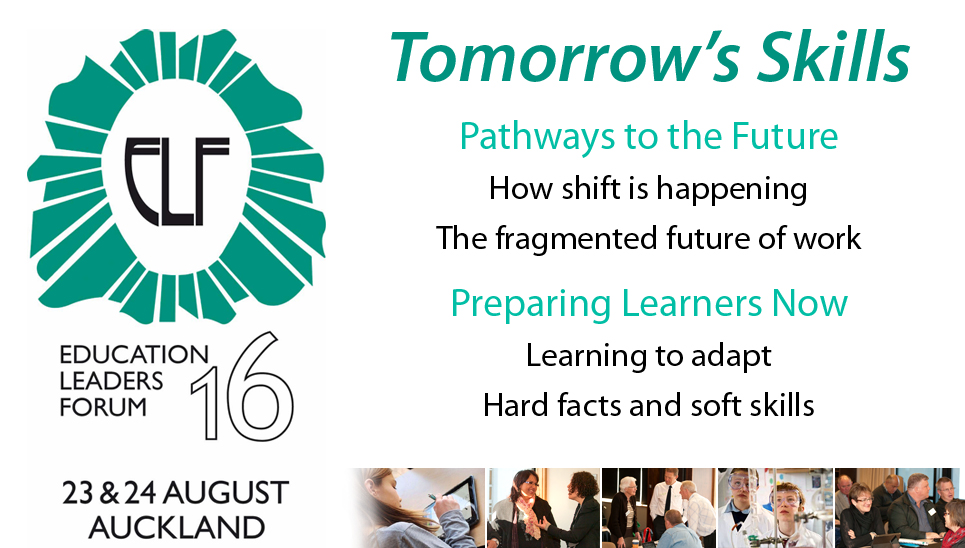EDUCATION LEADERS FORUM 2016: OVERVIEW
“On average, by 2020, more than a third of the desired core skill sets of most occupations will be comprised of skills that are not yet considered crucial to the job today, according to our respondents. Overall, social skills—such as persuasion, emotional intelligence and teaching others—will be in higher demand across industries than narrow technical skills, such as programming or equipment operation and control. In essence, technical skills will need to be supplemented with strong social and collaboration skills.” The 2015 World Economic Forum report The Future of Jobs
The tenth annual Education Leaders Forum will be held on 23 & 24 August 2016 at the Waipuna Hotel in Auckland. We are adding the details of contributors as they are confirmed.
ELF16 is about understanding the seismic shifts happening in the world of work, the demand for different skills and the implications for education at all levels.
Education at any level is not just about preparing people for the world of work. There are broader educational aims as well. However employment readiness and adaptability are important aspects for individuals, organisations and the wider society.
Yesterday’s Schools?
“… 65% of children entering primary school today will ultimately end up working in completely new job types that don’t yet exist.” World Economic Forum report The Future of Jobs [1]
“Tomorrow’s Schools” was implemented a quarter of a century ago in a world which no longer exists. In a digitised and globalised new world the nature of work is changing rapidly. Governments, industry and communities are grappling internationally with the educational implications.
Over the last 25 years New Zealand has seen a rise in the ratio of skilled professionals, an increase in physical and virtual talent mobility, a big jump in the number of women in tertiary education and the workforce and a trend of unskilled men exiting the workplace. The economy has lost clerical workers, tradesmen, labourers and machinery operators. It has and gained professionals in fields like law and IT.
By one estimate 40% of all jobs are threatened by automation in the next 15 years. Many jobs are less secure because they are part-time, temporary or rise out of self-employment initiatives. At the same time there are many new opportunities for those with the required talents and skills.
Pathways to the Future
*How Shift is Happening
The world of work is changing irrevocably in terms of what is done, where and by whom. Drones, electric cars, 3d printing, hover boards, augmented reality and virtual reality will all be our collective reality in short order… More
*The Fragmented Future of Work
The 2015 WEF Future of Jobs report points out that in such a rapidly evolving employment landscape, the ability to anticipate and prepare for future skills requirements, job content and the aggregate effect on employment is increasingly critical for businesses, governments and individuals… More
Preparing Learners Now
*Learning to adapt
It is impossible to say what challenges will confront today’s students, or what automated or virtual workplaces of the future will look like. How can education best prepare young people now to navigate their way through an increasingly complex world by becoming effective, lifelong learners capable of responding to relentless change?… More
*Hard facts and soft skills
A 2015 Economist Intelligence Unit report Driving the skills agenda: Preparing students for the future shows how evolving business needs, technological advances and new work structures are redefining what are considered to be valuable skills for the future… More
[1] http://www3.weforum.org/docs/WEF_FOJ_Executive_Summary_Jobs.pdf
To find out more about ELF 2016 contact: Lyall Lukey, ELF Convener 03 3228 293 or 021 310 808 or email lyall@smartnet.co.nz
















